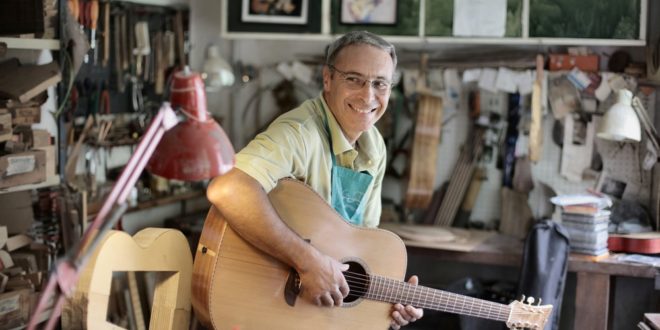Guitars produce a distinct and quality sound not just from the strings, but also from the tonewood of the body. The soundboard, the back, and the sides, all contribute to the desirable sound of this stringed instrument. Some brands and manufacturers source out their tonewood from sources that are used and hidden by other species.
Sustainability issues arise, and as consumers, it is wise to consider having an ecological option while still pursuing music. Here are the most sustainable guitar woods and the common brands that use them.
1. Basswood
This tonewood is an excellent alternative to the common ash or alder. It produces a great tonal balance. A meaty low-end is also noted in this tonewood and softness is pleasing when it comes to trebles. One of the things that hold guitar enthusiasts back is that it lacks an aesthetic look. The absence of grain and the minimal color make it a bit bland as a body of the guitar.
Depending on the manufacturers, this tonewood can have excellent dynamics and definition that can give the sound that distinct oomph.
This has been associated with high-end manufacturers. There have been a lot of signature models from John Petrucci, Guthrie Govan, and Joe Satriani’s that are high-quality guitars made of basswood. There have also been Fender reissue models that use basswood for the body alone.
2. Ekoa
Ekoa is an interesting wood alternative that is highly sustainable. This is a great option if you want to leave a lesser carbon footprint on the planet as it is made from bio-free resin materials and flax linen fiber. The bio-free resin is upcycled from various post-industrial processes.
Durability is hard to question when it comes to Ekoa because it is essentially stiffer than fiberglass. A bonus is that it is lighter than carbon fiber. It is also stable under humidity and temperature changes. Compared to the most common tonewood which is Spruce, this produces a better sound because of its higher stiffness-to-weight feature.
Blackbird Guitars is quite known to have eco-friendly products with their well-known Ekoa guitars as a tonewood. The first Ekoa guitar from Blackbird was a concert ukulele, which won various recognitions in the composites industry. The same guitar manufacturer later introduced the El Capitan which was also made out of Ekoa.
3. Korina
Also known as the “White Limba”, Korina is a sustainable wood from Central and West Africa. It has a basic light tone which gradually darkens as it is exposed to light. The wood itself can sometimes have yellowish areas with aesthetic black or dark streaks. The grain is moderately visible and growth rings can also be seen when it is used as a tonewood. The Black Limba is its other nickname because of the more pronounced grains. This has been used as an alternative to Mahogany even in the ‘50s. Aside from the light color, it can also have a lighter weight compared to other tonewood. When played, guitarists highly appreciate how it offers a lot of depth, while having a multi-dimensional mid-range.
The brand that has been known to produce Korina as their tonewood is Gibson. They were popularly known in the late 1950s with their Modernistic Series. The famous Korina guitars were Flying V and Explorer. They also produced other guitars with a similar template and used other sustainable wood products other than the Korina.
4. Flaxwood
The innovative Flaxwood could be your sustainable alternative of choice. This new tone is made up by breaking natural wood and injection and is bound by a binding agent that is acoustically sensitive. It is then molded to become the body of most guitars. It offers guitarists the acoustic consistency that they can’t have in other sustainable alternatives. It also provides a dynamic response in all of the guitar’s ranges. This material is also unaffected by the differences in humidity.
Flaxwood Guitars is well-known for producing guitars of its name. They offer a wide range of models made up of flaxwood and even have other options for customization according to your specs. All their guitars have quality semi-acoustic architecture, and durability is quite at par with the regular tonewoods.
5. Sapele
This sustainable tonewood has often used a substitute for the pristine Mahogany. It has a dark reddish-brown color that darkens over time. It shows figured grain patterns with interlocked and wavy grains. It is a fast-growing wood that has gained the attention of various guitar manufacturers. This alternative is known for its consistent tonal output. Compared to Mahogany, this produces sounds that are slightly brighter due to its higher density.
Taylor Guitars has been in the frontlines of producing eco-friendly and highly sustainable instruments. The Sapele guitars they have produced are compatible with a lot of playing styles. The demand for this kind of guitar has been growing year after year, and Taylor Guitars have never disappointed enthusiasts and professional players in providing a wide range of sustainable models.
6. Koa
This exotic wood from Hawaii is popular with custom guitar manufacturers. It is a dense tropical hardwood that blends a beautiful mid-range focus. It has a variable color that ranges from a medium gold hue to a reddish-brown. One of its most unique features is that the sound it produces evolves to mellow, rich, and resonant overtones the longer that it is used and played. However, it decays over time and is also susceptible to termites.
This type of wood is not considered to be endangered, yet it can be scarce just solely for guitar-making. Taylor Guitars are also known to have Koa as their tonewood. It has even partnered with other companies to promote intensive Koa planting in Hawaii, like Martin Guitars.
7. Recyclables
One of the things you should look into for highly sustainable guitar woods is recyclables. Although it may look different and playing with it can be unusual, it uniquely produces quality music. Common recyclables that turn out great are oil cans and cigar boxes as guitars. Simon Lee Guitars are famous for making guitars made of recycled materials. It shuns away from hardwood, but the quality of their well-known Cyclotron is reliable and attractive.
Being a guitarist won’t limit you to playing only with the usually known tonewood. There is a vast option for sustainability when it comes to guitars, which will go beyond your imagination. You will be surprised with the tone, melody, and quality of these alternatives, and will let you play in peace knowing that you contribute less to the carbon emission in the world.
About the Author
Charles is the founder, and managing editor of TheGuitarJunky.com, a site that helps aspiring musicians become real musicians. He owns a couple of sustainable carbon fiber acoustic guitars such as from KLOS and Lava.



